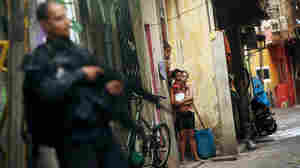
Lourdes Garcia-Navarro
South America Correspondent
Lourdes Garcia-Navarro is an NPR international correspondent covering South America for NPR. She is based in Sao Paulo, Brazil.
Previously, she served a NPR's correspondent based in Israel, reporting on stories happening throughout the Middle East. She was one of the first reporters to enter Libya after the 2011 Arab Spring uprising began and spent months painting a deep and vivid portrait of a country at war. Often at great personal risk, Garcia-Navarro captured history in the making with stunning insight, courage and humanity.
For her work covering the Arab Spring, Garcia-Navarro was awarded a 2011 George Foster Peabody Award, a Lowell Thomas Award from the Overseas Press Club, and an Edward R. Murrow Award from the Corporation for Public Broadcasting and the Alliance for Women and the Media's Gracie Award for Outstanding Individual Achievement.
Before her assignment to Jerusalem began in 2009, Garcia-Navarro served for more than a year as NPR News' Baghdad Bureau Chief and before that three years as NPR's foreign correspondent in Mexico City, reporting from that region as well as on special assignments abroad.
Garcia-Navarro got her start in journalism as a freelancer with the BBC World Service and Voice of America, reporting from Cuba, Syria, Panama and Europe. She later became a producer for Associated Press Television News before transitioning to AP Radio. While there, Garcia-Navarro covered post-Sept. 11 events in Afghanistan and developments in Jerusalem. In 2002, she began a two-year reporting stint based in Iraq.
In addition to the Murrow award, Garcia-Navarro was honored with the 2006 Daniel Schorr Journalism Prize for a two-part series "Migrants' Job Search Empties Mexican Community." She contributed to NPR News reporting on Iraq, which was recognized with a 2005 Peabody Award and a 2007 Alfred I. duPont-Columbia University Silver Baton.
Garcia-Navarro holds a Bachelor of Science degree in International Relations from Georgetown University and an Master of Arts degree in journalism from City University in London.










